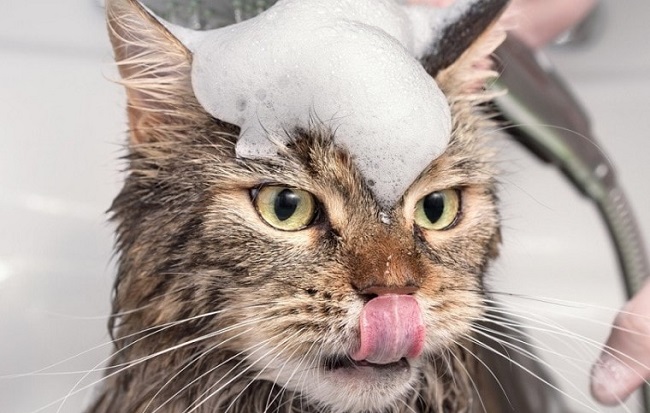Cats are known for their meticulous grooming habits. Unfortunately, their curiosity can often lead them into messes that require a helping hand from their human companions.
This brings us to a very important question – Can Dawn dish soap kill cats? While Dawn is a popular choice for cleaning many things due to its effectiveness and mild formula, it’s crucial to understand how it can affect our furry companions.

Can Dawn Dish Soap Harm Cats?
Many of you may have heard of the use of Dawn dish soap for wildlife rescue operations during oil spills.
Read Also:
The soap is excellent at breaking down grease and oil, making it a savior for many animals in these situations. However, using it on your domesticated cat requires a nuanced understanding.
Dawn dish soap is not inherently toxic to cats. However, it is not designed for use on pets and can lead to various problems, including skin irritation, vomiting, diarrhea, and in severe cases, metabolic changes due to ingestion.
The Potential Risks of Using Dawn Dish Soap on Cats
These are some of the potential risks of using dish soap on cats:
1. Skin Irritation
Cats have sensitive skin. The chemicals in Dawn dish soap, designed to break down oils, can strip away the natural oils on a cat’s fur and skin. This can lead to dryness, itching, redness, and irritation.
2. Ingestion Dangers
Cats are notorious groomers, and any soap residue left on their fur is likely to be ingested during self-grooming. While Dawn dish soap is not toxic per se, ingestion can cause gastrointestinal upset leading to vomiting or diarrhea.
3. Metabolic Changes
In extreme cases, continuous ingestion of soap can lead to changes in a cat’s metabolism. It can disrupt the balance of electrolytes, leading to potentially severe health issues such as muscle weakness, seizures, and in very rare instances, death.
The Safe Use of Dawn Dish Soap on Cats
While it’s not recommended to use Dawn dish soap routinely for cat baths, there are situations when it may be necessary – such as when your feline friend gets into a sticky or oily mess. If Dawn dish soap must be used, it’s crucial to do so responsibly.
- Use a small amount, diluted with a lot of water.
- Avoid the face, especially the eyes and ears.
- Rinse thoroughly to ensure no soap residue remains on the fur.
Understanding Cat’s Skin and Their Special Requirements
Unlike humans, cats have thinner and more sensitive skin. Moreover, their skin has a different pH level. While human skin is more on the acidic side, with a pH of around 5.5, cat skin is more neutral, with a pH of 6.2 to 7.5.
Human soaps, including Dawn dish soap, are often formulated to match our skin’s acidity, which is not ideal for cats.
This difference in pH means that even mild human soap can disrupt the balance of a cat’s skin, leading to discomfort, irritation, or dryness. Therefore, it’s always better to opt for shampoos and soaps specifically designed for cats.
Alternatives to Dawn Dish Soap for Cats
Knowing the potential risks of using Dawn dish soap on cats, what are some safer alternatives?
Pet-Specific Shampoos: Various brands offer pet-specific shampoos formulated with the correct pH balance for cats. They are designed to be gentle on a cat’s skin and fur, while effectively cleaning them.
Waterless Cat Shampoos: These are a great option for cats who despise water. These shampoos don’t need to be rinsed out, reducing the chance of any product being left on their fur for ingestion during grooming.
Cat Wipes: For a quick clean-up, cat wipes can be a great choice. They help remove dirt and dander, leaving your cat’s fur clean and fresh.
Professional Grooming: If your cat is extremely dirty or has been exposed to harmful substances, a professional groomer or a veterinarian will know the safest methods to get them clean.
Preventing Accidental Ingestion of Dawn Dish Soap
If you ever find yourself needing to use Dawn dish soap or any other non-pet-specific product, you can take steps to minimize the risk of ingestion.
Rinse Thoroughly: After washing, be sure to rinse your cat thoroughly. Ensuring that no soap remains on their fur can prevent ingestion during grooming.
Distract After Bathing: Provide your cat with distractions such as toys or treats immediately after a bath. This can delay their instinctive grooming, allowing their fur to dry completely, and further reducing the chances of ingestion.
Always remember, prevention is better than cure. It’s vital to keep potentially harmful substances like Dawn dish soap out of reach of your pets. This can prevent accidental contact or ingestion, ensuring your feline friend stays safe and healthy.
Read Also:
Conclusion
In conclusion, Dawn dish soap will not typically kill cats. However, its inappropriate use can lead to health complications. It’s essential to prioritize products specifically designed for cats to ensure their health and wellbeing.
If your cat gets into a mess that water and cat-friendly shampoo can’t clean, consult with a veterinarian before resorting to human or household cleaning products.
As cat owners, it’s our responsibility to create a safe environment for our feline friends. This includes being vigilant about the products we use around them.
Remember, what’s safe for us isn’t always safe for our pets. Stay tuned for more informative articles to help you provide the best care for your beloved pets. Your cat’s health is our priority.
























